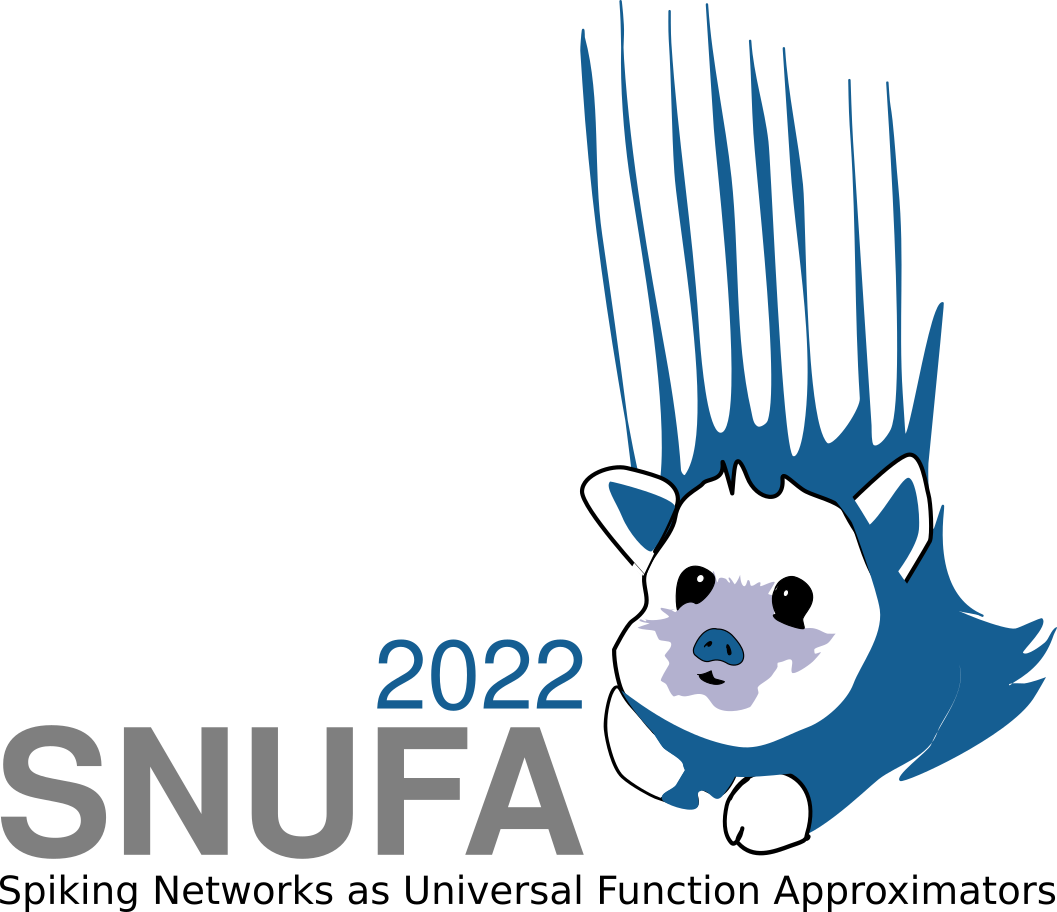SNUFA 2022

Brief summary. This online workshop brings together researchers in the fields of computational neuroscience, machine learning, and neuromorphic engineering to present their work and discuss ways of translating these findings into a better understanding of neural circuits. Topics include artificial and biologically plausible learning algorithms and the dissection of trained spiking circuits toward understanding neural processing. We have a manageable number of talks with ample time for discussions.
Executive committee. Katie Schuman, Timothée Masquelier, Dan Goodman, and Friedemann Zenke.
Quick links. Register (free) Talks
Key information
Workshop. 9-10 November 2022, European afternoons.
Registration. Free but mandatory. Click here to register.
Abstract submission. Closed (deadline was 28 September 2022).
Invited speakers. Charlotte Frenkel (TU Delft), Priya Panda (Yale), Yiota Poirazi (Institute of Molecular Biology and Biotechnology IMBB), Yonghong Tian (Peking University)
Talks. Talks will be streamed on CrowdCast with many thanks to WorldWideNeuro for sponsoring this.
Posters and AGM. These will be streamed on Zoom and links will be emailed to registered participants.
Agenda
Click here to open in Google Calendar (allows you to add to your own calendar).
| Time (CET) | Session | Local date/time |
|---|---|---|
| November 9th | ||
| 14:00 | Welcome by the organizers | |
| Session 1 (Chair: Katie Schuman) | ||
| 14:10 | Priya Panda, Yale (invited) Algorithm-Hardware Co-design for Efficient and Robust Spiking Neural Networks |
|
| 14:55 | Thomas Limbacher, Ozan Özdenizci, Robert Legenstein (TU Graz) Memory-enriched computation and learning in spiking neural networks through Hebbian plasticity abstract |
|
| 15:15 | M. Nardin, J. W. Phillips, W. F. Podlaski, S. W. Keemink (IST Austria) Nonlinear computations in spiking neural networks through multiplicative synapses abstract |
|
| 15:35 | Break (30mins) | |
| Session 2 (Chair: Friedemann Zenke) | ||
| 16:05 | Panayiota Poirazi, Institute of Molecular Biology and Biotechnology (IMBB) Why dendrites matter for biological and artificial circuits |
|
| 16:50 | A. Subramoney, K. K. Nazeer, M. Schöne, C. Mayr, D. Kappel (University of Bochum) Beyond Biologically Plausible Spiking Networks for Neuromorphic Computing abstract |
|
| 17:10 | A. Galloni, A. Peddada, A. Milstein (Rutgers) Behavioral Timescale Synaptic Plasticity (BTSP) for biologically plausible credit assignment across multiple layers via top-down gating of dendritic plasticity abstract |
|
| 17:30 | Break (30mins) | |
| 18:00 | Poster session (Zoom) | |
| November 10th | ||
| 14:00 | Welcome to day two | |
| Session 3 (Chair: Timothée Masquelier) | ||
| 14:10 | Yonghong Tian, Peking University (invited) Spiking Deep Learning with SpikingJelly |
|
| 14:55 | W. F. Podlaski, C. K. Machens (Champalimaud) Universal function approximation in balanced spiking networks through convex-concave boundary composition abstract |
|
| 15:15 | B. Yin, F. Corradi, and S. M. Bohte (CWI) Training Dynamic Spiking Neural Network via Forward Propagation Through Time abstract |
|
| 15:35 | Break (15mins) | |
| 15:50 | Annual General Meeting (Zoom) Open to everyone to discuss issues and opportunities for this community. |
|
| Session 4 (Chair: Dan Goodman) | ||
| 16:30 | Charlotte Frenkel, TU Delft (invited) Merging insights from artificial and biological neural networks for neuromorphic intelligence |
|
| 17:15 | Z. Liao, D. Hadjiabadi, S. Terada, I. Soltesz, A. Losonczy (Columbia) A biologically plausible inhibitory plasticity rule for world-model learning in SNNs abstract |
|
| 17:35 | C. B. Currin, K. Stecher, C. Pfeffer, G. Novarino, and T. P. Vogels (IST Austria) Bridging the gap between artificial models and cortical circuits abstract |
|
| 17:55 | Closing remarks by organizers |
Format
- Two half days
- 4 invited talks
- 8 contributed talks
- Poster session
- Annual General Meeting
Abstract submissions
We sent workshop participants a set of blinded abstracts to vote on whether or not they would be interested to see them as a talk. We selected the eight most highly requested abstracts for contributed talks. Abstracts not selected for a talk are presented as posters. If you’re interested in adapting this idea for your workshop, we wrote up a quick guide on how to do it.
Previous editions
2021 Talks can be viewed on Crowdcast or YouTube
2020 You can read the meeting report here, and watch the talks and discussions on Crowdcast or YouTube.